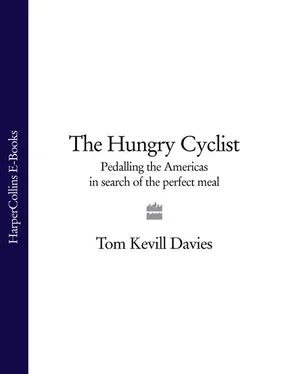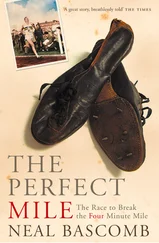‘You cycle with all that gear on your bike, eh?’
‘I like to eat.’
Placing a couple of flat and steady rocks around the fire, I sweated off some chopped onion with a little oil in one pan before adding chopped garlic and a couple of pinches of dried cumin. I added one cup of brown rice, which sizzled and cracked, and after a few minutes added two cups of water and a crumbled stock cube. Leaving the rice bubbling, I added the remains of the chopped onion and the rest of the garlic to the other pan and put in the courgettes, the rain hissing as it hit the bottom of the pan. The courgette began to colour and I added the tomatoes and some seasoning. The rice was ready. Dishing up a healthy portion on a plate, I added a little of what could almost be called Rocky mountain ratatouille and served it to Dave.
‘Voila.’
‘You sure like your food, eh.’ Dave began attacking his supper.
‘Oh, nothing special,’ I said, ashamed to admit that only a few hours before I had been stuffing myself in one of the world’s smartest hotels. For pudding I cored the two apples and filled the centres with a mixture of three damp digestive biscuits I found in a pocket, some honey, raisins and a pinch of cinnamon. I stewed them in a few inches of water and after a long wait while chatting over a strong cup of coffee they were ready, the piping-hot apples sticky and spicy-sweet.
We stayed up and talked a little about our respective lives on the road. A year before, Dave’s mother had had to go into a nursing home and in order to cover the costs Dave had been forced to sell their apartment. Without a job he had no alternative but to camp for the ensuing year in a park in Calgary, from where he was able to visit his mother every day. This trip to the Rockies was his holiday. Before long the bitter cold sent us into the relative warmth of our tents. I stretched my balaclava over my head, pulled on my woolly socks and gloves and wriggled about for a few minutes to generate a little heat. It was no five-star hotel, but after my evening with Dave I was beginning to understand that comfort and discomfort were no more than a state of mind.
The following morning I emerged wearily from my tent cursing the cold, frantically blowing into my hands and stamping my feet in an attempt to reboot my circulation. Dave was already up and about, chopping wood and successfully resurrecting the previous night’s fire. My water bottles had frozen solid and after filling a pan in a nearby stream we brewed coffee and cooked oats. Then we said our goodbyes, and I was on my way to Lake Louise and the Icefields Parkway.
Fabled to be one of the world’s most beautiful roads and tracing the spine of the North American continental divide, the Icefields Parkway runs some 250 kilometres from the surreal turquoise waters of Lake Louise to Jasper National Park. Built by unemployed men as part of the ‘make work’ project during the Great Depression, it passes within viewing distance of seven upland glaciers. Dreamlike lakes the colour of scarab beetles sit peacefully below these vast fields of ice that cling precariously to the mountains, slowly dripping into the rivers that fill the air with the sound of rushing water and tumbling boulders. Cycling this road, where large trucks are thankfully prohibited, might be hard work but I have no doubt it is the best way to appreciate the outstanding natural beauty hidden in the heart of the Rocky mountains. Huge slabs of what was once the earth’s crust have been smashed and thrust in all directions by violent seismic upheavals, creating the vast sharp-edged limestone mountains and splintered cliff-faces that surround you. Millions of years of slow-moving ice and rushing melt-water have done their best to tidy up this violent mess, carving out smooth valley basins.
Two days later, as I sweated inside my restrictive waterproof shell on a morning of slow uphill cycling in indecisive rain, the sun eventually broke through the thick clouds and the dramatic beauty of the valley I was cycling through became visible. Finding a peaceful clearing some way from the road I stopped for lunch beside the ominously named Mosquito Creek. I had not passed a shop since Lake Louise and my meagre rations dictated another lacklustre banquet of peanut butter and honey sandwiches, two bruised apples and a chocolate bar. Unsatisfied with lunch I lay out my damp clothes on a series of large boulders to dry in the afternoon sun and, doing the same to myself, began drifting asleep to the peaceful tune of the icy waters rushing in the creek. The warmth of the afternoon vanished as the sun hid behind the mountains and it was replaced by a sharp coolness that quickly reminded me where I was. It seemed a perfect place to camp, and deciding to stay put for the night I spent the next hour crashing around in the bushes collecting the driest wood I could find.
Organising my findings into three tidy piles, small, medium and large, I split some of the smaller branches into ‘feather sticks’ (of which Dave would have been proud), cut a strip of rubber from an old inner tube, covered it with smaller twigs and struck a match. On all fours, I moved around my fire. A directed blast of breath here. Another well-positioned breath there. Just move this stick a little to let some more air in…
After ten minutes of concentrated tweaking, blowing and tinkering I was rewarded with the first comforting crackles and hisses of fire. I tenderly placed a few bigger sticks on the climbing flames and, swelling with primitive pride, I got to my feet and took in my surroundings. The wide creek ran away across the valley floor which was littered with sun-bleached tree trunks and heavy boulders, a reminder of its powerful potential. The broken peaks of the cold mountains rose hundreds of feet above the pointed tops of the densely packed trees that carpeted their slopes, and above it all the first star burst through the cloudless sky. It promised to be a bitterly cold night. In the gathering darkness my world was soon reduced to all that was illuminated by the dancing flames of my fire.
‘Hey, Hungry Cyclist, why don’t you come in here and take off my wrapper?’
‘I’m rationing. Go away.’
‘Oh come on. Come and wrap your lips around my sweet chocolate and caramel centre.’
‘I’m saving you for tomorrow. Leave me alone.’
‘But I’ll taste so much better tonight.’
There is only so long you can sit in the bitter cold knowing that an uneaten chocolate bar waits for you at the bottom of a bag. After falling for the advances of Babe Ruth, I prepared to turn in and set about hanging what remained of my food in a nearby tree. Not only would this prevent me from decimating my rations in a fit of night starvation, it would also thwart the efforts of another hungry predator.
Ever since US President Theodore (Teddy) Roosevelt, the great conservationist, saved a baby bear from being shot on a hunting trip, humans have had a close affinity with these ursine creatures. We all cherish Teddy bears. We anthropomorphise them into likable characters, Paddington, Winnie, Balloo and Yogi, and a trip to the Rockies would not be complete without catching a glimpse of one of these majestic and lovable animals in the wild.
‘Seen any bears?’
‘Black or grizzly?’
‘Any cubs?’
These are customary questions amongst visitors to the Rockies, and the traffic jams and tailbacks of eager tourists leaning from car windows and motor homes to capture a piece of moving bush on their digital cameras are testament to the important role bears play in the tourist industry of the mountains. But here lies a problem. Man and bear aren’t the best roommates.
Every autumn, bears make the very sensible decision to get into a cave and sleep for four months, and before taking this long nap they go on a feeding frenzy to fatten up. As their normal food supply is depleted by the damming of rivers and deforestation, they have to look elsewhere, and thus they have developed a taste for easily found human food. Rubbish bins, local tips and campsites provide easy and delicious pickings. This means that bear attacks in the Rockies at this time of year are by no means unheard of. All visitors are advised to carry a bear bell, a pathetic little thing more suited for decorating a Christmas tree than scaring away a 600-pound ravenous beast, and park rangers, local people and road signs are full of advice on how to best avoid becoming a Teddy bear’s picnic.
Читать дальше












